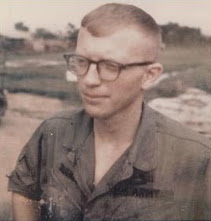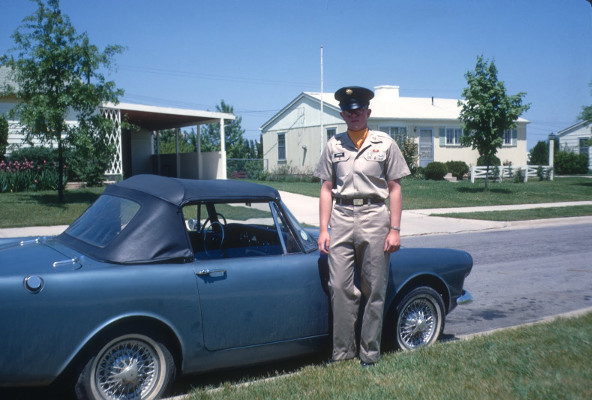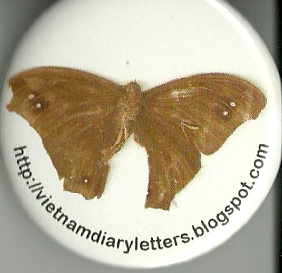Keeping the Memory Alive: Robert Hughes

by Howard Landon McAllister
In the latter stages of the Vietnam War, the Americans decided to gradually turn the fighting over to the forces of the Republic of Vietnam. American advisors had served with Vietnamese units throughout the war, but for the first time, soldiers of both countries served in platoon-size intelligence-gathering units called Combined Reconnaissance and Intelligence Platoons. The name was quickly reduced to a military acronym, CRIP.
The concept produced some valuable information about enemy activities, but like all small units of the type, they were too small to engage in protracted fighting with North Vietnamese combat units, and they had terrible casualty rates in cases when they were not reinforced on the ground quickly, and when they could not be rapidly supported by fire from the air or artillery.
There were reports from some of the Americans in the CRIPs that their operations were being compromised by the Vietnamese members of the platoons. If so, documentary evidence does not exist to prove the extent to which it was true.
Robert Hughes, a quiet sensitive, young Wolfhound from Westerville, Ohio, was a member of the CRIP on February 12, 1968, when he died in a firefight in Hau Nghia Province. The area was a hotbed of enemy activity near the Cambodia border.
Proof that serving in the CRIP was a high-risk job is evident in the number of men who served in the unit during the time. Names and faces changed constantly, and the men rarely got a chance to know each other very well. Leonard Brooks, a member of the unit, remarked on this fact in a letter to Pat Hux, Robert Hughes’s sister:
“I remember him as a quiet, soft-spoken man, who didn’t talk much and kind of kept to himself. Those were some very hard times and the platoon was made up of a lot of different personalities and attitudes, and we had each other, like it or not.”
At that time, the Americans in the CRIP called themselves the “Mighty Ten,” based on their number. Their association as soldiers was relatively brief. Brooks recalled the events on the day Robert Hughes was killed in action, and described the action to Pat Hux in a letter.

“I was the very last person to speak with Robert. We had crawled back to the corner of a berm in one of the rice paddies after taking heavy casualties from the initial rocket, small arms and heavy machinegun fire…. They began to come out of the spots and attempted to walk over us. Robert was between me and Gordon and we were pinned down. Raye, Orand, and Pottenger were in the immediate area. I remember bandaging Orand’s hand, Gordon’s leg and reinforcing the dressing to Pottenger’s face. All had been shot. Robert then got hit in the hand and I bandaged that up. The fighting was very heavy and at close quarters. Then as Robert continued to fire at the forces, his rifle took a hit, and as he was attempting to clear it, he got hit and he was gone instantly.”
The living members of the Mighty Ten were rescued by a Vietnamese mechanized unit with an American advisor named Captain Arthur Radvilas. The next morning, accompanied by armored personnel carriers, they recovered the bodies of the fallen.
 The world today little resembles the one Robert Hughes left so many years ago. But it is easy to think he would be pleased by the way his sister Pat Hux has kept his memory alive. She has established a “blog” for his collected letters, and the things he sent home from Vietnam while he was there, and other reminders of his life. Hughes was a good observer of life around him. His letters were illustrated by drawings; sometimes they were whimsical, and sometimes acid, but they were always poignant. Pat Hux has kept everything he sent, including a dried sprig of bamboo vegetation, and a sere, faded moth as a powerful symbol for her project. The moth is displayed on the lapel pin pictured at the right.
The world today little resembles the one Robert Hughes left so many years ago. But it is easy to think he would be pleased by the way his sister Pat Hux has kept his memory alive. She has established a “blog” for his collected letters, and the things he sent home from Vietnam while he was there, and other reminders of his life. Hughes was a good observer of life around him. His letters were illustrated by drawings; sometimes they were whimsical, and sometimes acid, but they were always poignant. Pat Hux has kept everything he sent, including a dried sprig of bamboo vegetation, and a sere, faded moth as a powerful symbol for her project. The moth is displayed on the lapel pin pictured at the right.
She has established a Facebook page in his name. It is possible for those who knew him, and others who know about him to go there and post conversations with him as if he goes there to read them and reply to them. For this day and age, it is a perfect memorial, with a kind of symbolism that transcends time and space. It is a reminder that men like Robert Hughes once walked among us. We are all better that he did. Rest in Peace, Wolfhound.
Copyright 2011 by Howard Landon McAllister
